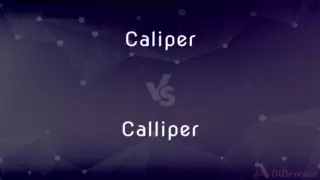Distractor vs. Distracter — What's the Difference?
By Tayyaba Rehman — Updated on September 22, 2023
"Distractor" and "distracter" both refer to something that diverts attention, with "distractor" being the more commonly accepted spelling.

Difference Between Distractor and Distracter
Table of Contents
ADVERTISEMENT
Key Differences
In the domain of language and its nuances, "distractor" and "distracter" occupy a unique position, given that they encapsulate the same meaning but differ slightly in their spelling. "Distractor" typically holds the title of being the more popularly used term in various contexts, especially in the world of standardized testing, where it refers to the incorrect options in a multiple-choice question.
"Distracter," while less frequently used, carries the same essence, denoting something that serves to divert or distract attention. However, it might be viewed by some as a less conventional spelling, despite being valid in its own right. Each term, regardless of the specific spelling, plays a pivotal role, especially in the academic and psychological sectors, to indicate things or stimuli that serve to detract or divert attention.
The distinction between "distractor" and "distracter" purely hinges on the ending "-or" versus "-er". While in many cases, "-or" and "-er" endings in words have regional preferences or distinctions in meaning, here, the difference is largely stylistic, and both forms are understood to mean the same thing.
It's essential to maintain consistency when using either term in written content. While both terms are correct, "distractor" enjoys broader acceptance and might be deemed more appropriate in formal contexts or publications. On the other hand, "distracter" might be encountered in older texts or specific niches but is no less accurate in conveying the idea of something that distracts.
Comparison Chart
Spelling
Ends in "-or"
Ends in "-er"
ADVERTISEMENT
Popularity
More commonly used
Less commonly used
Meaning
Something that diverts attention
Something that diverts attention
Usage Context
Often found in standardized testing contexts
May be seen in older texts or specific niches
Stylistic Preference
Preferred in many formal contexts
Seen as a less conventional spelling
Compare with Definitions
Distractor
An incorrect option in a multiple-choice question.
She quickly identified the distractor among the answer choices.
Distracter
Something causing confusion or disturbance.
His constant chatter was a distracter during the study session.
Distractor
A stimulus that misleads or confuses.
The flashing lights served as a distractor during the experiment.
Distracter
A factor or item leading one away from the focus.
Too many colors on the slide can be a distracter for the audience.
Distractor
A factor causing disturbance or interruption.
Mobile phones can act as a distractor in classrooms.
Distracter
An element that serves to divert attention.
The additional graphics were merely a distracter from the core message.
Distractor
Something that diverts attention from the main subject.
The loud music outside was a major distractor during the lecture.
Distracter
A misleading stimulus or option.
Among the choices, two were correct and one was a distracter.
Distractor
A decoy or diversionary tactic.
The enemy used smoke as a distractor during the retreat.
Distracter
A tactic or item used to mislead or divert.
The magician used a distracter to complete his trick.
Distractor
One of the incorrect answers presented as a choice in a multiple-choice test.
Distracter
One of the incorrect answers presented as a choice in a multiple-choice test.
Distractor
A person or thing that distracts
The visual channel is capable of being a powerful distractor
Distracter
That which distracts, or serves as a distraction.
Distractor
Alternative spelling of distracter
Distracter
Any of the incorrect answers in a multiple-choice question, serving to distract from the correct answer.
Distracter
One who, or that which, distracts away.
Common Curiosities
Which is more common: distractor or distracter?
"Distractor" is more commonly used.
Do both words mean the same thing?
Yes, both refer to something that diverts attention.
Can either term be used interchangeably?
Yes, but it's best to be consistent in a given piece of writing.
Is "distracter" incorrect?
No, it's a valid spelling, just less common.
Are there other words with similar "-or" and "-er" variations?
Yes, like "advisor" and "adviser," though meanings might differ.
Does the choice between the terms affect comprehension?
Not significantly; both convey the idea of diverting attention.
Can "distracter" be used in academic writing?
Yes, though "distractor" might be preferred in many contexts.
Does the "-or" and "-er" distinction have a grammatical basis?
Not in this case; the difference is largely stylistic.
Are the words nouns or adjectives?
Both "distractor" and "distracter" are nouns.
In what context might I see "distractor" used?
In standardized testing, referring to incorrect options.
Which term should I use in a formal research paper?
"Distractor" is likely the safer choice due to broader acceptance.
What's the opposite of a distractor/distracter?
There isn't a direct antonym, but contextually, a correct option or focus-enhancing element could be opposites.
How do I avoid confusing the two spellings?
Remember that "distractor" is more common and widely accepted.
Is there a regional preference for either term?
Not particularly, but "distractor" is broadly accepted.
Is "distractor" specific to any field?
It's widely used but especially relevant in testing and psychology.
Share Your Discovery

Previous Comparison
Diagramme vs. Diagram
Next Comparison
Caliper vs. CalliperAuthor Spotlight
Written by
Tayyaba RehmanTayyaba Rehman is a distinguished writer, currently serving as a primary contributor to askdifference.com. As a researcher in semantics and etymology, Tayyaba's passion for the complexity of languages and their distinctions has found a perfect home on the platform. Tayyaba delves into the intricacies of language, distinguishing between commonly confused words and phrases, thereby providing clarity for readers worldwide.













































